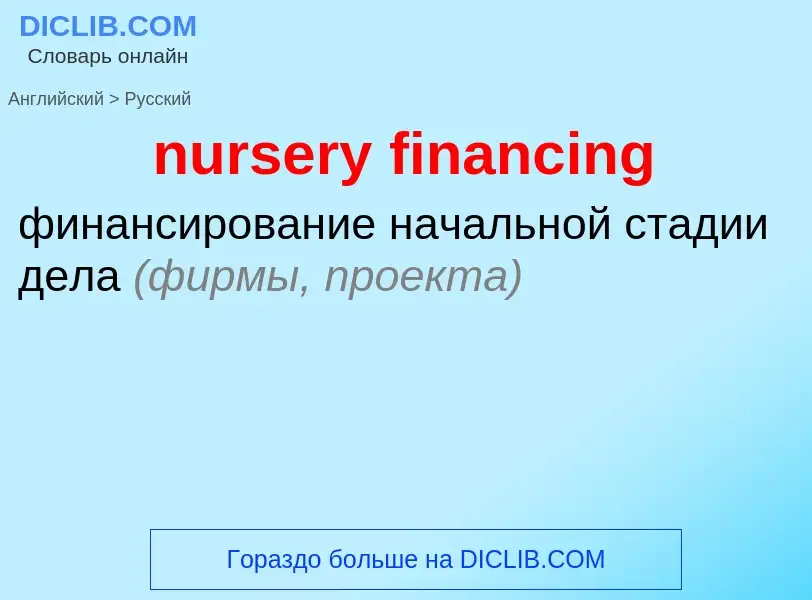ترجمة وتحليل الكلمات عن طريق الذكاء الاصطناعي ChatGPT
في هذه الصفحة يمكنك الحصول على تحليل مفصل لكلمة أو عبارة باستخدام أفضل تقنيات الذكاء الاصطناعي المتوفرة اليوم:
- كيف يتم استخدام الكلمة في اللغة
- تردد الكلمة
- ما إذا كانت الكلمة تستخدم في كثير من الأحيان في اللغة المنطوقة أو المكتوبة
- خيارات الترجمة إلى الروسية أو الإسبانية، على التوالي
- أمثلة على استخدام الكلمة (عدة عبارات مع الترجمة)
- أصل الكلمة
nursery financing - ترجمة إلى الروسية
['nə:strɪraɪmz]
общая лексика
дет-ские стишки (изобилуют фольклорными образами, отражают народные традиции и легенды, их основные персонажи: Шалтай-болтай [Humpty Dumpty], старый король Коул [Old King Cole], Джек и Джилл [Jack and Jill])
детские стишки
побасёнки
прибаутки
تعريف
ويكيبيديا
Terrorism financing is the provision of funds or providing financial support to individual terrorists or non-state actors.
Most countries have implemented measures to counter terrorism financing (CTF) often as part of their money laundering laws. Some countries and multinational organisations have created a list of organisations that they regard as terrorist organisations, though there is no consistency as to which organisations are designated as being terrorist by each country. The Financial Action Task Force on Money Laundering (FATF) has made recommendations to members relating to CTF. It has created a Blacklist and Greylist of countries that have not taken adequate CTF action. As of 24 October 2019, the FATF blacklist (Call for action nations) only listed two countries for terrorism financing: North Korea and Iran; while the FATF greylist (Other monitored jurisdictions) had 12 countries: Pakistan (see Pakistan and state-sponsored terrorism), Bahamas, Botswana, Cambodia, Ghana, Iceland, Mongolia, Panama, Syria, Trinidad and Tobago, Yemen, and Zimbabwe. In general, the supply of funds to designated terrorist organisations is outlawed, though the enforcement varies.
Initially the focus of CTF efforts was on non-profit organizations, unregistered money services businesses (MSBs) (including so called underground banking or ‘Hawalas’) and the criminalisation of the act itself.


!["[[Baa, Baa, Black Sheep]]", from a 1901 illustration by [[William Wallace Denslow]] "[[Baa, Baa, Black Sheep]]", from a 1901 illustration by [[William Wallace Denslow]]](https://commons.wikimedia.org/wiki/Special:FilePath/The Black sheep illustrated by William Wallace Denslow.jpg?width=200)
!["[[Three Blinde Mice]]" (1609), published by [[Thomas Ravenscroft]].<ref>Thomas Ravenscroft., ''Deuteromelia or The Seconde part of Musicks melodie, or melodius Musicke. Of Pleasant Roundalaies;'' Printed for Thomas Adams (1609). "Rounds or Catches of 3 Voices, #13" ([https://archive.org/stream/pammeliadeutrome12rave#page/n95/mode/2up Online version])</ref> "[[Three Blinde Mice]]" (1609), published by [[Thomas Ravenscroft]].<ref>Thomas Ravenscroft., ''Deuteromelia or The Seconde part of Musicks melodie, or melodius Musicke. Of Pleasant Roundalaies;'' Printed for Thomas Adams (1609). "Rounds or Catches of 3 Voices, #13" ([https://archive.org/stream/pammeliadeutrome12rave#page/n95/mode/2up Online version])</ref>](https://commons.wikimedia.org/wiki/Special:FilePath/Three Blinde Mice three voice round Deuteromelia 13 (1609).png?width=200)
